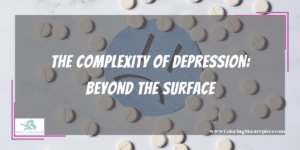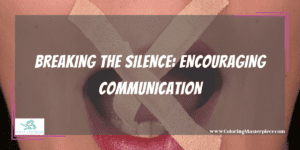Although depression is a severe mental health illness that can afflict millions of people globally, it is commonly associated with color. People who are affected must deal with the mystifying disorder’s nuanced emotional and cognitive effects, which range from depressing to hopeless.
In this article, we will look at the multidimensional nature of this hidden struggle and how empathy and support can help individuals who are going through it. Let’s look at the true colors of depression and see how we can work together to combat this difficult mental health issue.
The Complexity of Depression: Beyond the Surface

Depression, an often misunderstood mental health illness, goes much beyond a passing sense of melancholy or blueness. It is the result of a complex and diverse interplay of genetic, biochemical, psychological, and environmental factors. Understanding this complex network of causes is critical for developing treatment and support strategies. By recognizing depression’s multidimensional character, we may break down the stigma around mental health and promote a more understanding and compassionate community.
It is influenced by genetic predisposition. Individuals with a family history of depression are more likely to develop the disorder themselves, according to research. Certain genetic differences can affect neurotransmitter activity and brain structure, predisposing some people to depressive episodes. It is important to remember, however, that genetics alone do not cause depression; rather, they establish a sensitivity that interacts with other factors.
Depression’s biological component includes changes in brain chemistry and hormone abnormalities. Serotonin, dopamine, and norepinephrine are neurotransmitters that play important roles in mood control. Depressive symptoms can result from disruptions in their levels or functioning. Hormonal changes, such as those encountered during puberty, pregnancy, or menopause, can also have an impact on mood and contribute to the start of depression.
Psychological elements, such as personality traits and coping techniques, have a substantial impact on how people respond to life’s obstacles. People who have low self-esteem, a gloomy outlook, or a proclivity to ruminate are more prone to depression. Unresolved trauma, such as childhood abuse or neglect, can leave profound emotional scars that appear later in life as depression. Chronic stress, social isolation, and a lack of support can aggravate depressed symptoms.
Environmental factors are very important in depression. Adverse life circumstances, such as the death of a loved one, financial difficulties, or major life changes, can set off depressive episodes. Living in an unsupportive or abusive environment can also be harmful to one’s mental health. Because of differences in social norms, availability of resources, and support networks, the prevalence of depression may vary between cultures and societies.
Given the complex network of circumstances that contribute to depression, there is no one-size-fits-all approach to understanding and treating it. Recognizing the complexities of sadness is critical for moving away from basic and stigmatizing views that may label people as “weak” or “lazy.” Instead, cultivating a caring and empathetic understanding might inspire people to seek treatment without fear of being judged.
A combination of therapies customized to the individual’s particular circumstances is often used to treat depression effectively. Medication can help correct neurotransmitter abnormalities and relieve severe symptoms. Psychotherapy, such as cognitive-behavioral therapy (CBT) or interpersonal therapy, can aid in the development of coping strategies and the resolution of underlying issues that contribute to depression. Friends, family, and support groups can all help to build a solid support system.
Preventive measures such as regular exercise, a balanced diet, adequate sleep, and stress management can improve mental health and lower the risk of depression. Healthy relationships and activities that bring joy and purpose to life might be important protective factors.
To learn how different colors help with depression, check out this article.
Colorless and Boundless: The Nature of Depression
Depression, an insidious disease that transcends color, knows no bounds in terms of its reach and damage. It is a formidable antagonist capable of afflicting people from all walks of life, spanning demographics, and affecting people of all ages, genders, and origins. Unlike a color, which can be limited to a spectrum, depression can affect everyone, without regard for prejudice or discrimination. This stark fact emphasizes the importance of overcoming the stigma that frequently accompanies mental health disorders.
In a world where outward looks and external circumstances are frequently held up as measures of happiness, the invisible challenges of those suffering from depression can be easily overlooked or trivialized. However, it is critical to understand that depression is not merely a reflection of weakness or a personal shortcoming. It is a medical disorder, a complex interaction of genetic, biochemical, psychological, and environmental elements that should be treated with the same compassion and understanding as any other physical ailment.
Depression’s pervasiveness in society serves as a sobering reminder that it is not an isolated issue. According to the World Health Organization, depression affects more than 264 million people globally. This startling number comprises people from all walks of life, cultures, and financial levels, refuting the myth that illness primarily affects particular groups.
The lack of discrimination that depression demonstrates makes addressing the stigma connected with mental health all the more important. These conditions are frequently surrounded by cultural myths and prejudices, maintaining an atmosphere of shame and silence. This stigma can be a powerful barrier, preventing people from seeking assistance, speaking up about their troubles, or even admitting they are depressed.
Education and knowledge are essential strategies for removing the stigma associated with depression. People might begin to confront their preconceived views and judgments by learning that this illness impacts individuals regardless of their external circumstances. As one would provide empathy and support to someone suffering from a visible physical condition, the same attitude should be taken with individuals fighting invisible conflicts within their thoughts.
Open discussions on mental health, led by people who have suffered from depression or mental health experts, can help to de-stigmatize the issue and build a culture of compassion and support. When public figures, celebrities, or powerful people discuss their mental health journeys, it can bring validation and support to those who are struggling in silence.
Regardless of socioeconomic level or geographic location, mental health resources such as counseling services, helplines, and support groups should be made freely available and accessible to all. These services can be lifelines for those in need while also providing essential instruction to the larger community, breaking down misconceptions, and promoting understanding.
Empathy: The Key to Connection
Empathy, a profound human ability, is the foundation of support for those traversing the perilous terrain of depression. It is a powerful instrument that requires a sincere effort to comprehend and connect with the feelings and experiences of others. When we empathize, we set aside preconceived assumptions and biases, immersing ourselves in another person’s reality and walking in their shoes with an open heart and mind. Empathy can be a lifeline in the context of despair, a beacon of light guiding folks through their darkest moments.
Empathizing with someone who is depressed is not about curing their problems or finding quick fixes. It is about validating their emotions, recognizing the legitimacy of their challenges, and assuring them that their emotions are heard and understood. Depression may be an isolated and stressful condition, and when people respond with empathy, it can lighten the load and make the journey less difficult.
We offer a safe and non-judgmental environment for others to reveal their deepest thoughts and emotions when we are sympathetic. People suffering from depression frequently fear stigma and rejection, which may encourage them to hide their suffering from others. When they find empathy, though, it becomes simpler for individuals to open up about their difficulties. An empathic listener creates an environment of trust and acceptance, allowing persons suffering from depression to express themselves authentically and without fear.
Empathy aids in breaking down the isolation walls that sadness erects around individuals. Someone who feels understood and encouraged is less likely to feel alone in their struggle. Knowing that others are prepared to listen and empathize can provide a ray of hope in the darkest of times. It can serve as a reminder to them that they are not alone and that there are individuals who genuinely care about their well-being.
It is critical to exercise active listening when seeking empathy. Active listening entails paying complete attention to the person speaking, not just their words, but also their tone, body language, and emotions. It entails delaying judgment, avoiding interruptions, and genuinely listening to what the other person is saying. We demonstrate that their views and feelings are valued through active listening, developing a sense of self-worth and affirmation.
Empathy also entails building compassion inside oneself. It necessitates acknowledging that each person’s path with depression is unique and that their experiences are impacted by a variety of factors. We can avoid making assumptions or delivering unwanted counsel if we acknowledge the complexities of their challenges. Instead, we may be present and supportive, allowing them to navigate their difficulties with autonomy and strength.
In some circumstances, empathy may go beyond simple emotional support. Encouraging people to seek professional support and therapy for depression is an important element of compassionate care. As compassionate supporters, we must own our limitations and advise persons suffering from depression to get treatment from mental health specialists who are trained to give thorough care.
Empathy promotion in society necessitates a collaborative effort. By encouraging mental health awareness and emotional intelligence, educational institutions, companies, and communities can play a critical role in creating empathy. We can foster a culture of compassion and understanding by incorporating empathy-building techniques into curricula, staff training programs, and community projects.
Breaking the Silence: Encouraging Communication

Depression, a common mental health disease, can be isolating and perplexing for people who suffer from it. The weight of overwhelming emotions and a persistent sense of emptiness can isolate people from the outside world as if they are trapped in a dark tunnel with no way out. Unfortunately, cultural beliefs and stigmas around mental health concerns sometimes aggravate this isolation, leaving those suffering from depression feeling misunderstood and hesitant to express their struggles.
To address this critical issue, it is critical to promote open and compassionate dialogue regarding mental health. We must strive hard to break down the barriers of secrecy and ignorance that surround depression and other mental health issues. It is critical to develop a supportive environment by providing individuals with secure and nonjudgmental settings in which they can openly share their feelings, opinions, and experiences.
Raising awareness about the complexities of mental health concerns is one of the first steps toward breaking the silence surrounding depression. Educating the public about depression and its many causes aids in the dispelling of myths and preconceptions. People who realize that depression is more than just “feeling sad” are more likely to approach the subject with empathy and compassion.
The media, schools, workplaces, and communities all play important roles in developing people’s attitudes toward mental health. We can create a culture that values and prioritizes emotional well-being by promoting accurate and sensitive portrayals of mental health in the media, incorporating mental health education in schools, implementing supportive policies in workplaces, and organizing community events centered on mental health awareness.
Sharing personal tales and experiences can have a significant impact on breaking down barriers and lowering depression stigma. Individuals who openly share their experiences humanize the condition, letting others relate and understand that they are not alone in their problems. This can have a knock-on effect, encouraging more individuals to speak up, seek treatment, and aid others.
Online platforms have developed as effective tools for encouraging open conversations about mental health. Social media, forums, and support groups allow people to connect with others who have had similar experiences, providing comfort and solidarity. These platforms are also used by mental health advocates and organizations to share information, resources, and encouragement, establishing a sense of community and understanding.
Employers can play a critical role in fostering a supportive atmosphere for employees’ mental health in the workplace. Implementing mental health initiatives, making counseling services available, and cultivating a culture that values work-life balance and employee well-being can all help to break the stigma around depression.
It is critical, however, to remember that breaking the silence is not simply the duty of persons suffering from depression or mental health experts. Everyone in society can help with this endeavor. We may create safe spaces for others to open up about their challenges if we practice active listening, empathy, and nonjudgment.
Supportive Networks: Building a Safety Net
Dealing with depression may be a very difficult and solitary process. Building a solid support network, on the other hand, is one of the most important lifelines for those dealing with this mental health problem. Friends, family members, and professional aid can all form part of a network that provides comfort, understanding, and assistance throughout the path of coping with depression. In the face of adversity, a support network can provide a ray of hope and serve as a source of resilience for people in need.
Friends and family are important members of a person’s support network when they are suffering from depression. They are frequently the most nearby and accessible providers of emotional support. During stressful times, a caring friend or family member can lend a listening ear, offer validation, and provide a shoulder to lean on. Having empathic and nonjudgmental loved ones offers a sense of security, allowing persons suffering from depression to express their thoughts openly without fear of rejection.
Friends and family members can also be powerful motivators in a support network. They can encourage their loved ones to seek professional assistance, such as therapy or counseling, and they can even accompany them to appointments if necessary. The combined encouragement and support of loved ones reinforces the idea that getting treatment is a positive and courageous step toward healing and recovery.
It is important to recognize, however, that not everyone has a strong support network within their immediate circle. Reaching out to support groups or online communities can be effective in such instances. These communities bring people together who have similar experiences, giving them a sense of belonging and minimizing feelings of isolation. People in such groups can share coping skills, offer advice, and form bonds with individuals who understand what they are going through.
Professional assistance is another important component of a support network for persons suffering from depression. Therapists, counselors, and psychiatrists are trained to provide specialized care and assistance that is tailored to each individual’s requirements. They provide a secure and confidential environment for people to examine their feelings, acquire insights into their cognitive processes, and build coping mechanisms to effectively manage depression.
Individuals can also use therapy sessions to work on developing healthy relationships and communication skills, which will improve their general well-being. A mental health expert can assist individuals in setting realistic objectives, dealing with past traumas, and developing resilience in the face of adversity.
Some people suffering from depression may benefit from medication in addition to treatment. Psychiatrists can determine the necessity for medication and prescribe antidepressants or other drugs to treat symptoms and restore emotional equilibrium. Medication, when used with therapy, can be an invaluable help in the treatment of depression.
The strength of a supportive network is in reminding people that they are not alone in their challenges. It gives hope in the most difficult times and fosters the conviction that healing is possible. This sense of belonging and connection helps to overcome the emotions of isolation that are frequently associated with sadness.
Individuals suffering from depression benefit from supportive networks as well. Resilience is the ability to recover from adversity, and a solid support system can help with this. Encouragement from friends, family, and mental health experts can motivate people to keep going even when they suffer setbacks or relapses. A supporting network can help people uncover their inner strength and the drive to continue on their path to healing and well-being.
To learn about the therapeutic journey toward improved mental well-being, check out this article.
The information provided by ColoringMasterpiece.com (“The Site”) is for general informational purposes only. All information on the Site is provided in good faith, however, we make no representation or warranty of any kind, express or implied, regarding the accuracy, adequacy, validity, reliability, availability, or completeness of any information on the Site. Under no circumstance shall we have any liability to you for any loss or damage of any kind incurred as a result of the use of the Site or Reliance on any information provided on the Site. Your use of the Site and your reliance on any information on the Site is solely at your own risk. This blog post is for educational purposes only and does not constitute legal advice. Please consult a legal expert to address your specific needs.
Terms and Conditions: https://coloringmasterpiece.com/terms-and-conditions/

